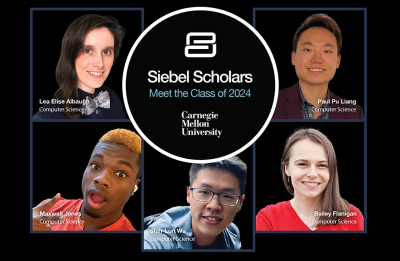Related People
Lea Albaugh
Five SCS Students Named 2024 Siebel Scholars

Five graduate students in Carnegie Mellon University's School of Computer Science have been named Siebel Scholars for 2024. Lea Albaugh, Bailey Flanigan, Maxwell Jones, Paul Pu Liang and Shih-Lun Wu will each receive $35,000 as part of the program.
Founded in 2000 by the Thomas and Stacey Siebel Foundation, the Siebel Scholars program recognizes nearly 100 students each year whose work influences the technologies, policies, and economic and social decisions that shape the future.
"Every year, the Siebel Scholars continue to impress me with their commitment to academics and influencing future society. This year's class is exceptional, and once again represents the best and brightest minds from around the globe who are advancing innovations in healthcare, artificial intelligence, financial services and more," said Thomas M. Siebel, chairman of the Siebel Scholars Foundation. "It is my distinct pleasure to welcome these students into this ever-growing, lifelong community, and I personally look forward to seeing their impact and contributions unfold."
Lea Albaugh researches fabrication and material creativity as a Ph.D. student at the Human-Computer Interaction Institute. Her work blends hardware and software engineering with design inquiry and craft practice to produce computationally tunable soft textile mechanisms, creative interfaces for complex machine knitting on industrial equipment, and playful and personal interaction with fabrication machines. Albaugh's research publications have been recognized with awards at the ACM SIGCHI and Designing Interactive Systems conferences, and she recently received a university-wide graduate student teaching award recognizing her classroom and lab teaching and innovative curriculum development.
Flanigan's work combines tools from computer science and political science to design and support more equitable, effective democratic decision processes. Major threads of her work consider how to ensure just representation of minority groups in voting systems, why deliberation can improve political decisions, and how to fairly and transparently select participants of deliberative mini-publics. Outside of research, Flanigan, a Ph.D. student in the Computer Science Department, is passionate about equitable education. She led the development and teaching of CS-JEDI, an introductory DEI course for first-year CS Ph.D. students at CMU.
Jones is pursuing a master's degree in machine learning, with interests in both computer vision and teaching. He has worked on both theoretical and applied machine learning research at CMU and at Meta, and conducts research on generative AI art applications at CMU. Beyond research, Jones is a four-year teaching assistant for introductory discrete math/theoretical CS courses, a panelist for AI info events at CMU, and has worked with AI high school classes offered by CMU over the summer. He received the Mark Stehlik Introductory and Service Teaching Award for his TA work in discrete math at CMU.
Liang, a Ph.D. student in machine learning, studies the foundations of multimodal machine learning with applications in socially intelligent AI, understanding human and machine intelligence, healthcare, and education. His research has been recognized by three best-paper awards and four fellowships. Outside of research, he loves teaching and advising, and received the Alan J. Perlis Graduate Student Teaching Award for co-instructing courses and organizing workshops and tutorials on multimodal machine learning.
Wu is a research-track master's student in the Language Technologies Institute whose research stands at the crossroads of audio, speech and music processing. His work in automated audio captioning (AAC) won the DCASE 2023 AAC challenge. His music processing research aims to improve the long-term musical structure/development of generated music, and bridge the gap between generative models and music creators with a wide range of musical expertise. He is a research scientist intern in the Audio AI Lab of Adobe Research and worked full-time as a research engineer on the music team of Taiwan AI Labs before coming to CMU.
Learn more about this year's class on the Siebel Scholars website.

